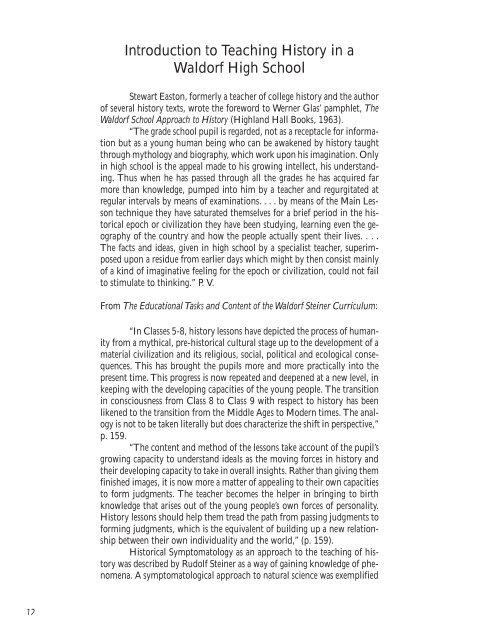Proceedings Colloquium on World History - Waldorf Research Institute
Proceedings Colloquium on World History - Waldorf Research Institute
Proceedings Colloquium on World History - Waldorf Research Institute
Create successful ePaper yourself
Turn your PDF publications into a flip-book with our unique Google optimized e-Paper software.
Introducti<strong>on</strong> to Teaching <strong>History</strong> in a<br />
<strong>Waldorf</strong> High School<br />
Stewart East<strong>on</strong>, formerly a teacher of college history and the author<br />
of several history texts, wrote the foreword to Werner Glas’ pamphlet, The<br />
<strong>Waldorf</strong> School Approach to <strong>History</strong> (Highland Hall Books, 1963).<br />
“The grade school pupil is regarded, not as a receptacle for informati<strong>on</strong><br />
but as a young human being who can be awakened by history taught<br />
through mythology and biography, which work up<strong>on</strong> his imaginati<strong>on</strong>. Only<br />
in high school is the appeal made to his growing intellect, his understanding.<br />
Thus when he has passed through all the grades he has acquired far<br />
more than knowledge, pumped into him by a teacher and regurgitated at<br />
regular intervals by means of examinati<strong>on</strong>s. . . . by means of the Main Less<strong>on</strong><br />
technique they have saturated themselves for a brief period in the historical<br />
epoch or civilizati<strong>on</strong> they have been studying, learning even the geography<br />
of the country and how the people actually spent their lives. . . .<br />
The facts and ideas, given in high school by a specialist teacher, superimposed<br />
up<strong>on</strong> a residue from earlier days which might by then c<strong>on</strong>sist mainly<br />
of a kind of imaginative feeling for the epoch or civilizati<strong>on</strong>, could not fail<br />
to stimulate to thinking.” P. V.<br />
From The Educati<strong>on</strong>al Tasks and C<strong>on</strong>tent of the <strong>Waldorf</strong> Steiner Curriculum:<br />
“In Classes 5-8, history less<strong>on</strong>s have depicted the process of humanity<br />
from a mythical, pre-historical cultural stage up to the development of a<br />
material civilizati<strong>on</strong> and its religious, social, political and ecological c<strong>on</strong>sequences.<br />
This has brought the pupils more and more practically into the<br />
present time. This progress is now repeated and deepened at a new level, in<br />
keeping with the developing capacities of the young people. The transiti<strong>on</strong><br />
in c<strong>on</strong>sciousness from Class 8 to Class 9 with respect to history has been<br />
likened to the transiti<strong>on</strong> from the Middle Ages to Modern times. The analogy<br />
is not to be taken literally but does characterize the shift in perspective,”<br />
p. 159.<br />
“The c<strong>on</strong>tent and method of the less<strong>on</strong>s take account of the pupil’s<br />
growing capacity to understand ideals as the moving forces in history and<br />
their developing capacity to take in overall insights. Rather than giving them<br />
finished images, it is now more a matter of appealing to their own capacities<br />
to form judgments. The teacher becomes the helper in bringing to birth<br />
knowledge that arises out of the young people’s own forces of pers<strong>on</strong>ality.<br />
<strong>History</strong> less<strong>on</strong>s should help them tread the path from passing judgments to<br />
forming judgments, which is the equivalent of building up a new relati<strong>on</strong>ship<br />
between their own individuality and the world,” (p. 159).<br />
Historical Symptomatology as an approach to the teaching of history<br />
was described by Rudolf Steiner as a way of gaining knowledge of phenomena.<br />
A symptomatological approach to natural science was exemplified<br />
12
















